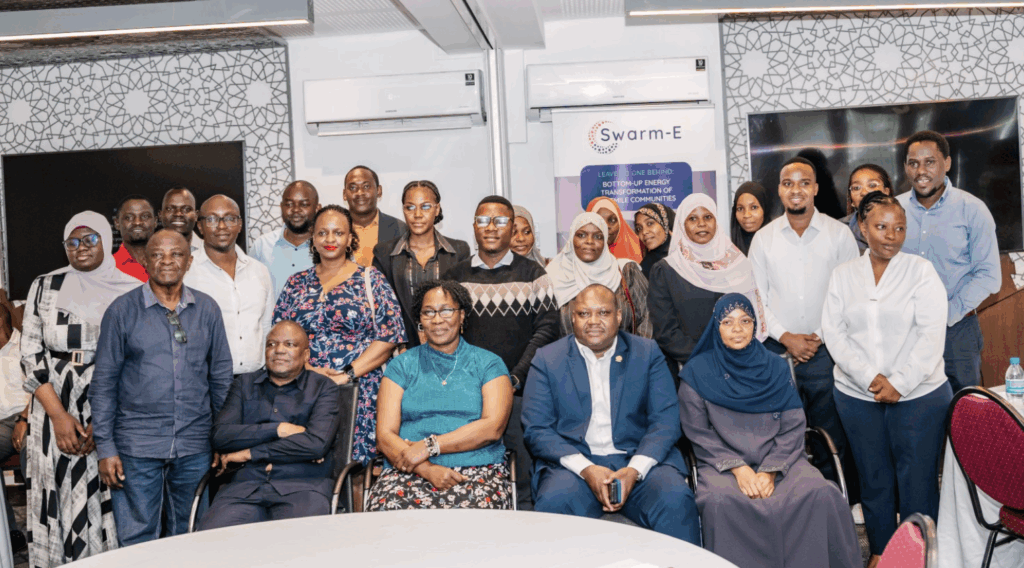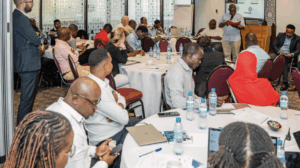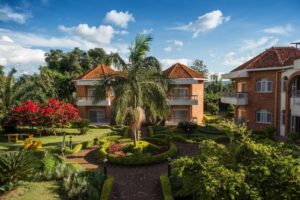The 2nd SWARM-E project Exploratory Workshop held on May 27th, 2025, at the Crowne Plaza Hotel in Dar es Salaam, marked a pivotal moment in Tanzania’s journey toward inclusive, decentralized, and sustainable energy systems. The event, organized by TAREA TZ as part of Renewable Energy Week 2025, brought together a dynamic group of stakeholders — from policymakers and engineers to NGOs, community representatives, and private sector actors — all united by a common goal: to transform energy access for remote and underserved communities, such as those on Kwale Island.
Technology & Policy Synergies
The day opened with a comprehensive presentation by Adrian Mapunda (ELICO Foundation) on the SWARM-E technological approach. The project’s goal: integrate decentralized mini-grid systems with PUE to elevate local livelihoods. TANESCO underlined the need for these systems to align with national grid standards to ensure smooth integration and sustainability. Possible transition paths — such as compensation, national grid integration, or conversion to Small Power Producers (SPPs) — were discussed for private mini-grid developers.
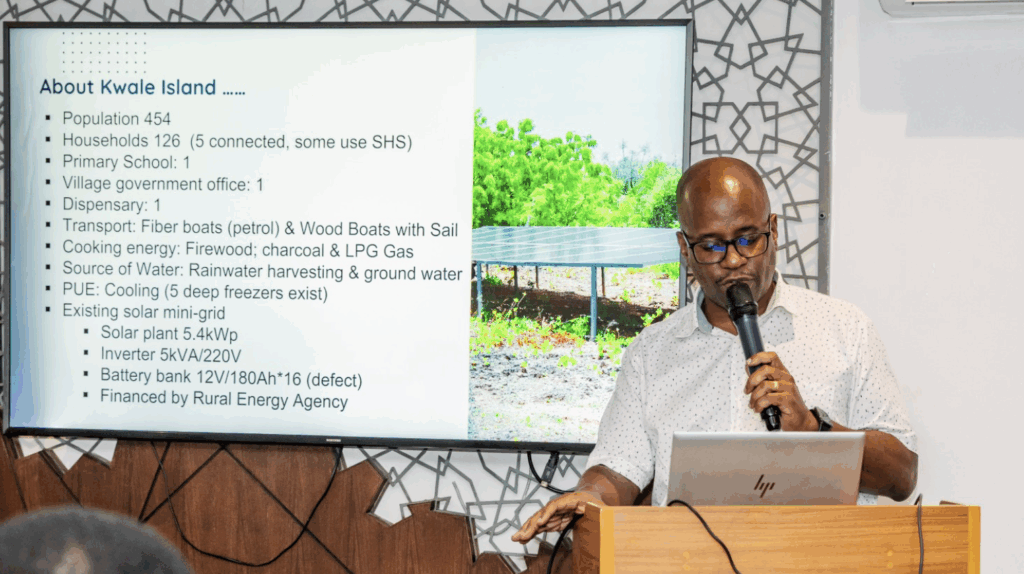
Regulation, Risk & Market Access
The workshop’s centerpiece was a high-level panel featuring:
– Eng. Victor Labaa – Electricity and Water Regulatory Authority (EWURA)
– Eng. Joyce Msangi – Ministry of Energy
– Eng. Samwel Kessy – Tanzania Electricity Supply Company (TANESCO)
– Eng. Kombe – Rural Energy Agency (REA)
Together, these public sector leaders addressed pressing regulatory, technical, and implementation challenges facing off-grid electrification, while proposing collaborative pathways to unlock innovation in mini-grids, productive use of energy (PUE), and e-mobility.
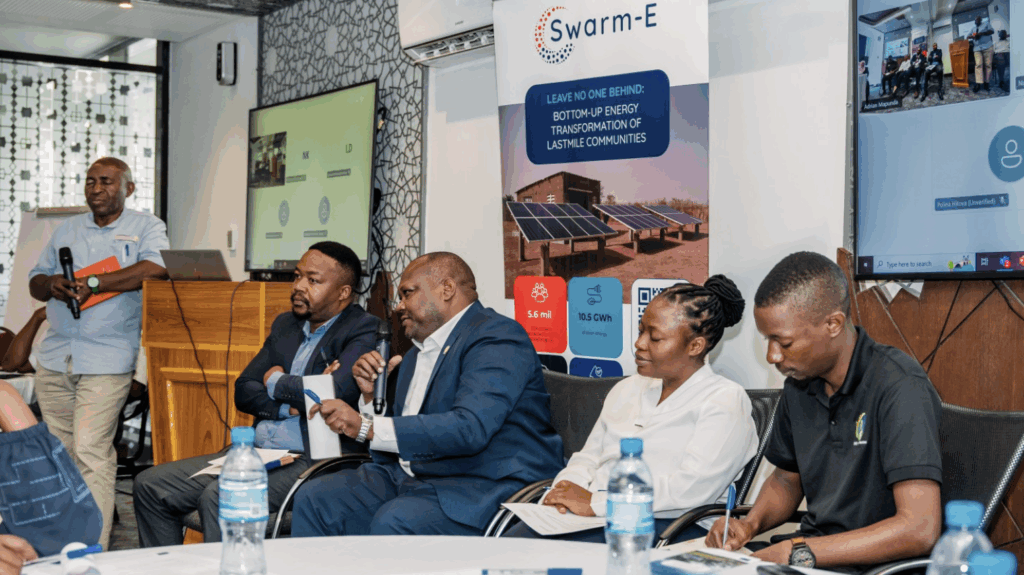
An engaging discussion followed on regulatory bottlenecks. EWURA and the Ministry of Energy clarified that compensation to developers hinges on adherence to national guidelines and proper registration. Audience members voiced concerns about market barriers where underperforming developers restrict new investment. Officials acknowledged these gaps and pointed to ongoing reforms aimed at easing transitions and improving oversight when the main grid reaches pre-electrified communities.
Local Impact & Productive Use
The session then zoomed into local-level impacts, particularly on Kwale Island. Based on participatory community research, the project team outlined several livelihood-enhancing technologies under consideration: desalination for drinking water, cold storage, seaweed grinding (mainly led by women), electric cooking appliances, and sewing machines. Participants asked vital questions on ownership, maintenance, and the revenue-sharing models needed to ensure sustainability.
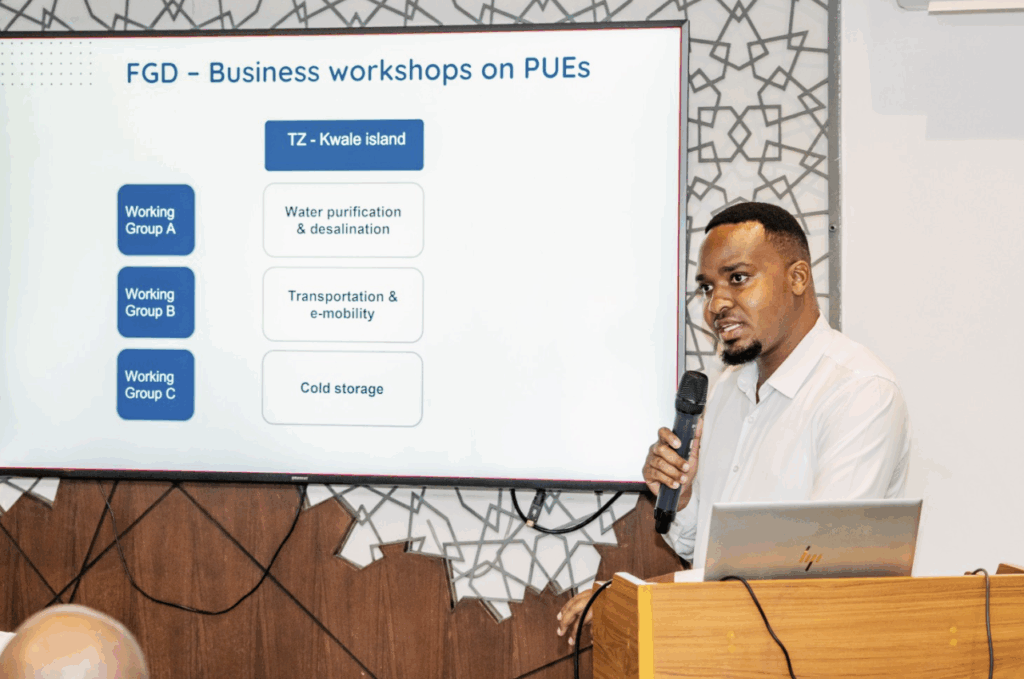
E-Mobility Trade-Offs
There was also spirited debate on the project’s e-mobility component. While electric fishing boats were initially considered, technical constraints and safety concerns — primarily limited battery range — shifted the project’s focus to electric two-wheelers. Participants encouraged revisiting water-based e-mobility solutions as technology advances and suggested interim alternatives like solar lanterns for night-time fishing.
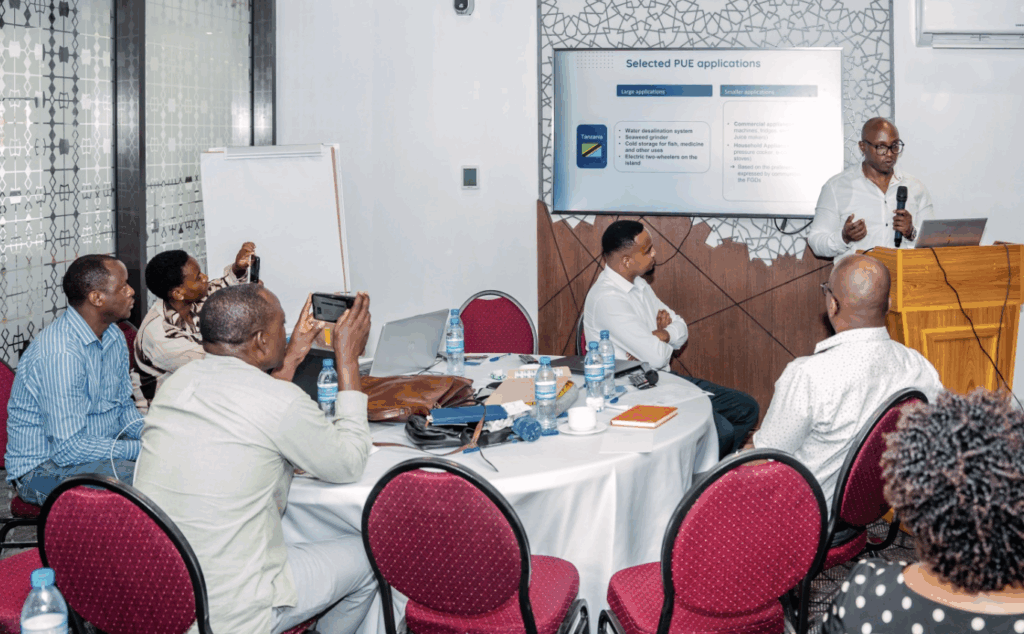
Building Capacity for Long-Term Impact
RES4Africa led the capacity-building session, with Luca Traini presenting a structured strategy encompassing technical training, user awareness, and entrepreneurial mentoring. A lively dialogue emerged around the optimal timing and scope of such training — with a consensus that early and continuous involvement of local technicians and vocational institutions is key. The workshop stressed the importance of a formal needs assessment to align training with actual local conditions.
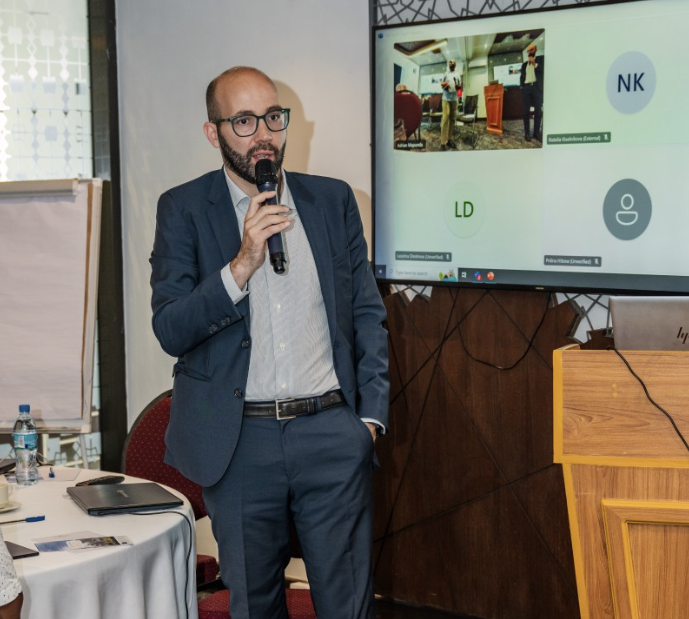
Gender & Youth Inclusion
Gender equity and youth empowerment were constant threads throughout the workshop. Attendees praised the focus on women-led economic activities, but also called for systematic gender monitoring, more technical training for women, and stronger support for youth-led ventures.
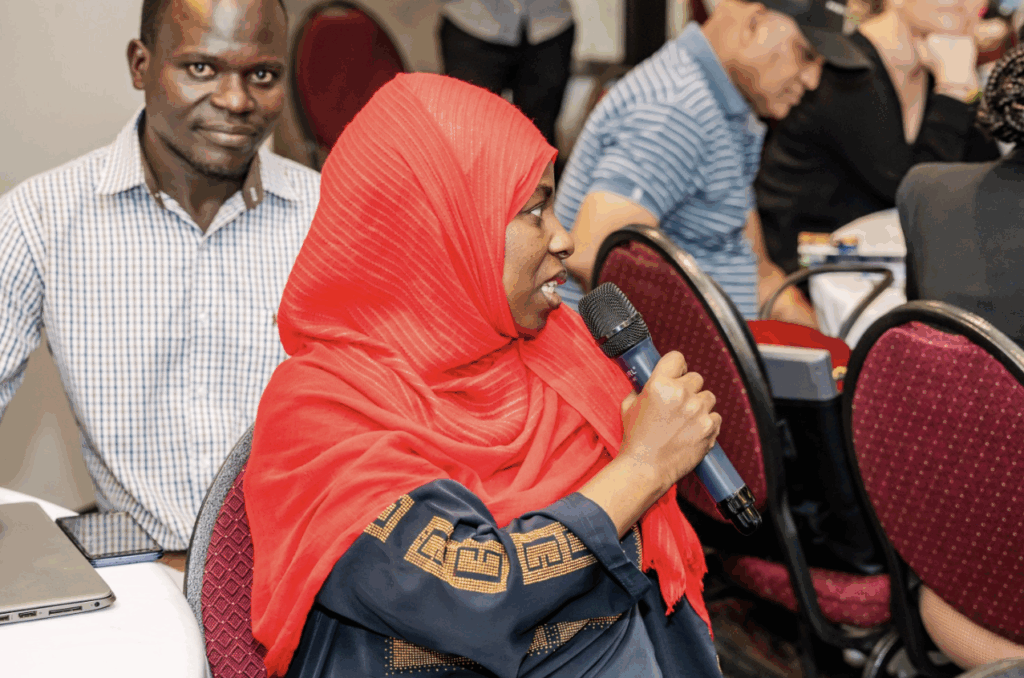
Ensuring Governance & Continuity
Many participants raised critical questions about the post-project sustainability of the SWARM-E model. In response, the project consortium emphasized its strategy of embedding ownership locally — through training, revenue models, and alignment with national institutions like VETA and the Ministry of Energy. Local authorities and regulators were urged to stay engaged early and often, especially when identifying failing systems or transitioning them to more capable operators.
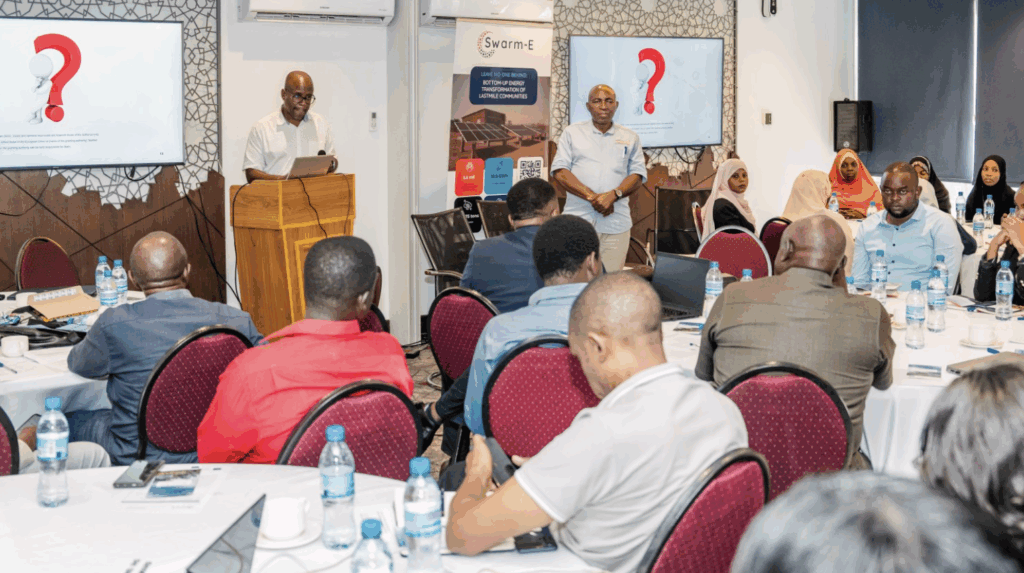
Looking Forward
The workshop closed with a reaffirmation of SWARM-E’s identity as a pilot and learning platform. The team reiterated its openness to ongoing feedback and its commitment to co-creating solutions with all stakeholders. EWURA was specifically encouraged to remain receptive to innovations such as peer-to-peer energy sharing — a novel concept in Tanzania but a core tenet of SWARM-E’s long-term vision.
This landmark event concluded with a strong sense of shared purpose. While challenges remain, the consensus was clear: decentralized, locally driven energy models — when implemented in close cooperation with national frameworks and local communities — hold the potential to drive transformative, inclusive development in Tanzania and beyond.
We would also like to thank the representatives of our project partners for their active contributions to the SWARM-E Exploratory Workshop in Dar es Salaam. @Matthew Mattimbwi (TAREA) moderated the panel and delivered the opening and closing remarks. Adrian Mapunda (Elico Foundation) introduced the SWARM-E technology and its relevance for Tanzania. Shadrak Omwenga (MEI) and Luca Traini (RES4Africa) led discussions and presented on productive uses of energy and capacity building. Frederick Mushi (Ekoglobe) added valuable input on practical applications at the local level. Their support and expertise were key to the success of the event.
